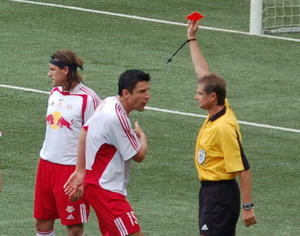
There are numerous reasons why footballers can get banned from playing football. Some of them are fair and balanced, others are completely ludicrous.
Sometimes they get banned for something that they’ve done on the pitch and other times their bans are for things that they’ve done off it.
Here we’ll have a look at the reasons that footballers can get bans, exploring the different ways that players can find themselves in the bad books of the powers that be. We’ll tell you about some of the more high profile examples as well as some of the weirder reasons why players weren’t allowed to take to the field of play.
For the purposes of putting some limit on this we’ll talk mostly of the English FA’s rules, but we will also reference international competitions.
On-Field Actions
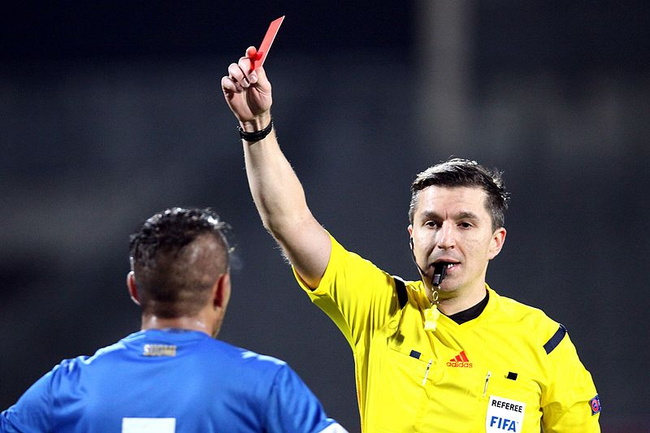
The most obvious reason why players pick up a ban that stops them from playing football is their on-field behaviour. We won’t bother explaining all of the Football Association’s rules here, but sufficed to say if players disobey the rules then they will incur the wrath of the match referee.
If a player breaks the rules numerous times or in such a manager as to convince the referee that they deserve a booking then they will receive a yellow card. Two yellow cards in one match will earn a red card that normally sees players have to serve a one-match ban. Players can also be banned for one game if they are shown six yellow cards over a period of time; again, this will be a one match ban.
If a player is guilty of a serious misdemeanour, normally considered to be violent conduct, then they will be given a red card.
This will result in them being banned for three matches and unable to take part in football matches during this time.
The ban normally applies to the competition that the player received the card in, though in England if they receive a red card in the Premier League, for example, they will also be banned from taking part in other domestic competitions.
If they’re banned in European competition they’ll still be able to play in the league.
Retrospective Action
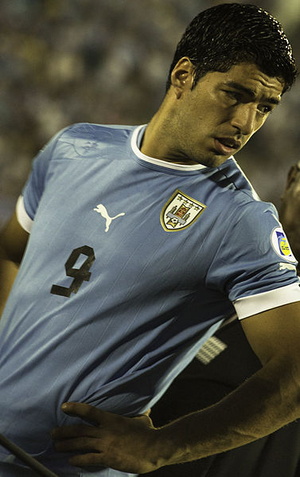
Match referees aren’t perfect; in fact most of the time they are very flawed indeed. They often miss incidents, especially if the player is ‘clever’ or devious in his action. When this happens the Football Association can review the footage and see if the player is worthy of a ban. In order for them to be able to do this, however, the match referee has to confirm in his written report of the game that he missed the incident in real time.
One of the most high-profile examples of this was Luis Suarez appearing to bite Chelsea’s Branislav Ivanovic in a game back in 2013. The Uruguayan had previously bitten a player whilst appearing for his former club Ajax, as well as being found guilty of racially abusing Manchester United’s Patrice Evra despite their being no video footage confirming Evra’s accusation. These prior incidents led to the FA deciding that a standard three game ban was insufficient for Suarez’s behaviour and so the Liverpool striker was banned for ten games.
Somewhat unbelievably, the striker was again guilty of biting a player the following year. This time he bit Giorgio Chiellini during a crucial World Cup Group D match in 2014. FIFA decided to ban him from all football related activity for four months, as well as for nine Uruguay international matches and give him a £66k fine.
The Chelsea striker Diego Costa has been banned retrospectively numerous times by the Football Association. The Brazilian born Spanish international has been bans imposed on him for stamping on an opponent, deliberately provoking an opposition player and more.
Manchester United’s Eric Cantona was something of an unusual example. The midfield maestro ‘kung fu kicked’ a Crystal Palace supporter who he later claimed had been racially abusing him. The incident was, rather obviously, seen by the match official and he was initially given a three game ban. This was later extended to eight-months and he was also sentenced to two weeks in jail for common assault. Ultimately he ended up doing 120 hours of community service instead.
Off-Field Incidents
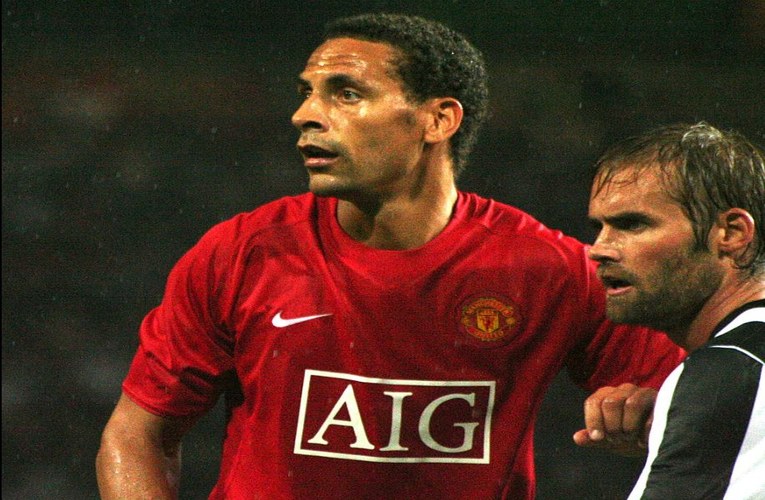
It is not just on-field incidents that can cause players to pick up bans, of course. Football Associations have the right to punish players for any incidents that they feel could bring the game into disrepute or that are seen as being against the spirit of the sport.
Back in 2003, for example, Manchester United defender Rio Ferdinand was handed an eight month ban and a £50,000 fine for missing a drugs test. He was asked to take the test at the club’s Carrington training facility but went home without doing so, claiming that he ‘forgot’. United called the ban ‘savage’, but the President of the World Anti-Doping Agency at the time thought Ferdinand had been treated lightly as he could have been banned for 24 months.
Another drugs related issue befell the then Manchester City defender Kolo Toure back in 2011. He failed a drugs test after apparently taking some of his wife’s slimming tablets. That resulted in the Ivorian being banned from football for six months.
Former Manchester United and Aston Villa goalkeeper Mark Bosnich was in trouble numerous times during his career for some truly bizarre reasons. In 1996 he was censured by the FA and given a £1000 fine for doing a Nazi salute towards Tottenham Hotspur fans. In 2002 he was banned for nine months after failing a drugs test due to cocaine being found in his system. As well as suffering from the ban he was also sacked by Chelsea, the club he was at at the time.

He wasn’t the only player to be sacked by Chelsea because of drug related issues. In 2004 Adrian Mutu was given a seven month ban and a £20,000 fine by the FA because he failed a drugs test for cocaine. Chelsea believed that he had breached his contract and terminated his services with them accordingly.
In 2002 Manchester United midfielder Roy Keane released his autobiography imaginatively entitled Keane: The Autobiography. In it he admitted that he had taken to the field in a match against Manchester City in 2001 and deliberately attempted to injure Alfie Haaland. At the time of the game he received a red card and a three match ban but when his book came out he was given a further five game ban and a £150,000 fine.
French striker Nicolas Anelka was sent home from the 2010 World Cup tournament by the French manager. The French Football Association decided to pin the blame for the country’s poor performance in the competition on the forward, banning him for eighteen games. This essentially resulted in his international retirement, with the player deciding not to appeal as he had already decided not to play for them again anyway.
Bizarre Bans
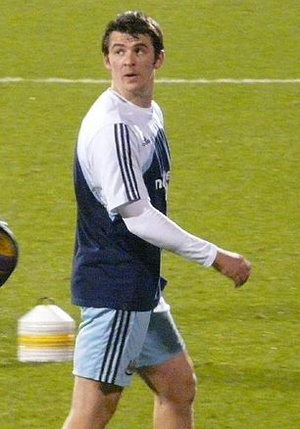
Most of the bans mentioned above are somewhat understandable, but there have also been a number of strange bans issued by Football Associations over the years, with some of them also being understandable and others just downright odd.
For example, in 1993 the Colombian goalkeeper René Higuita was unable to take to the field to play for his country after he was sentenced to seven months in jail for assisting with a kidnapping. In 2004 he was then banned for testing positive for cocaine, as if to complete the Colombian stereotype.
Joey Barton has been banned a number of times over the years by the FA, each occasion being due to violent conduct. In 2008 he was banned for six games and given a six game suspended ban for assaulting his Manchester City teammate Ousmane Dabo during training. In 2010 he was banned for three matches after punching Morten Gamst Pedersen in the chest during a match and on the last game of the 2011-2012 season he was sent off for a bad tackle before kicking Sergio Aguero in the knee and attempting to head-butt Vincent Kompany. He was given a 12 match ban for this behaviour.
In November 1992 Vinnie Jones was given a suspended ban of six months for commentating on a video that glorified football violence and dirty tricks in the game. He was also fined £20,000 for the incident.
Numerous players have been banned for betting on football matches over the years. Perhaps the most high profile example of this came in the 1960s when David Layne, Peter Swan and Tony Kay were all banned for life for betting on their team, Sheffield Wednesday, to lose a match. The ban was lifted after seven years.
Perhaps one of the oddest bans in recent times occurred in Tipperary’s Southern and District League. At a Tipperary Cup semi-final match between Clonmel Celtic and Clonmel Town a player for Kilsheelan United entered the ground without paying the entrance fee. The reason why he didn’t pay was unknown but there was no major problem at the time and the match continued without incident. However when he went to his club on Monday he discovered that he was banned ‘indefinitely’ by the TSDL until the matter was resolved.
